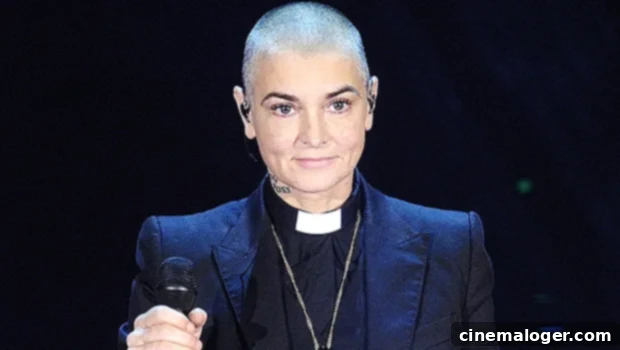Sinead O’Connor’s Profound Journey: Unpacking Her Enduring Battle with Mental Health and Lasting Legacy
The world mourned the loss of Sinead O’Connor, the iconic Irish singer-songwriter, who passed away at the age of 56 on July 26, 2023. Her family released a heartfelt statement announcing the tragic news, expressing profound devastation and requesting privacy during such an intensely difficult period. “It is with great sadness that we announce the passing of our beloved Sinéad. Her family and friends are devastated and have requested privacy at this very difficult time,” they conveyed to The Irish Times.
Sinead O’Connor captivated global audiences with her powerful voice and fearless artistry, famously known for her chart-topping rendition of “Nothing Compares 2 U,” alongside other notable tracks like “This Is The Day.” Beyond her musical genius, she frequently found herself at the center of public discourse due to her outspoken nature and various controversies. One of the most unforgettable instances occurred in 1992 when she famously tore up a photograph of Pope John Paul II during a live performance on Saturday Night Live. While her rebellious spirit often made headlines, it was her courageous honesty about her long-standing mental health struggles that truly resonated with many toward the end of her life. This article delves into Sinead’s decades-long battle with mental health, exploring her diagnoses, her candid discussions, and the significant impact her openness had on public perception.

Her journey through mental illness was complex and often publicly documented, making her an accidental advocate for countless individuals facing similar challenges. Here, we explore the intricate details of her health battles, offering insight into the conditions she managed and the profound statements she shared with the world. Through her vulnerability, Sinead shed light on the realities of living with mental illness, breaking down stigmas and encouraging dialogue.
If you or someone you know needs support now, call or text 988 or chat 988lifeline.org. The 988 Suicide & Crisis Lifeline is available 24/7 in the U.S. and offers confidential support to anyone in crisis.
Sinead O’Connor’s Diagnosis: Living with Bipolar Disorder

The acclaimed musician, born in Ireland, was diagnosed with bipolar disorder in the mid-2000s, as reported by PEOPLE. This diagnosis marked a significant turning point in her public narrative, as she bravely chose to speak openly about her experiences. In 2007, she made a powerful appearance on The Oprah Winfrey Show, where she discussed the disorder with remarkable candor. During the interview, Sinead shared her belief that her condition was not something she was born with, but rather a direct consequence of the early life trauma she endured. “I don’t think I was born with bipolar disorder—I believe it was created as a result of the violence I experienced,” she stated, linking her mental health struggles to her childhood experiences. Her rise to global superstardom, paradoxically, seemed to exacerbate her struggles, adding immense pressure to an already challenging personal journey.
Sinead elaborated on the difficulties of navigating mental illness under the intense scrutiny of the public eye. “It didn’t really help in terms of being well or a stable person the fact that I really was getting kicked around, metaphorically speaking, by the media for years,” she explained during her interview with Oprah. The constant barrage of criticism and judgment from the media took a heavy toll. “It seemed every time I went to work, all I was getting told was what a dreadful, terrible person I was. And I couldn’t really manage all of that on top of everything else.” Her words highlighted the profound impact of public perception and media scrutiny on a person grappling with mental health issues, emphasizing how a lack of understanding can isolate and harm.
Understanding Bipolar Disorder: A Deeper Look
Bipolar disorder, also known as manic depression, is a serious mental health condition characterized by extreme shifts in mood, energy, activity levels, and concentration, according to the Mayo Clinic website. Individuals with bipolar disorder experience distinct periods of emotional highs, known as mania or hypomania, and lows, which are depressive episodes. These mood swings can vary in frequency, ranging from rare occurrences to multiple episodes within a single year, significantly impacting daily life and overall well-being. During manic episodes, individuals may feel euphoric, highly energetic, and experience racing thoughts, decreased need for sleep, and impulsive behavior. Conversely, depressive episodes are marked by profound sadness, loss of interest in activities, fatigue, and feelings of worthlessness.
Managing bipolar disorder often requires a multifaceted approach to treatment. Common interventions include medication, such as mood stabilizers and antipsychotics, which help regulate brain chemistry to reduce the severity and frequency of mood swings. Psychotherapy, particularly cognitive behavioral therapy (CBT) and interpersonal and social rhythm therapy (IPSRT), is also crucial in helping individuals develop coping strategies, manage stress, and establish stable routines. Day treatment programs and, in more severe cases, hospitalization, provide intensive support and monitoring to help stabilize individuals experiencing acute manic or depressive episodes. Sinead’s openness about her diagnosis helped demystify the condition for many, illustrating that even successful public figures face these profound personal battles.
Decades of Struggle: Depression, CPTSD, and Suicidal Thoughts
Sinead’s mental health struggles extended beyond bipolar disorder to include severe depression, complex post-traumatic stress disorder (CPTSD), and recurrent suicidal thoughts. Her honesty about these challenges was a testament to her courage. In a revealing 2005 interview with The Independent UK, Sinead disclosed a harrowing suicide attempt in 1999. She recounted the agonizing experience, stating, “I have made one suicide attempt in my life, and that was on my 33rd birthday, after a session in court that day where it was suggested that for the rest of my life I would only see my daughter once a month.” This devastating setback, combined with her underlying struggles, pushed her to the brink. “I made a very serious suicide attempt, and I did almost die,” she confessed, highlighting the intensity of her pain.
Years later, in 2021, Sinead appeared on Carson Daly’s show, where she further elaborated on her battle with CPTSD. This condition, often resulting from prolonged or repeated trauma, was a significant part of her narrative. “I suffer from a condition called complex post-traumatic stress disorder, from things that I went through growing up,” she told the host. During this discussion, she revisited the infamous SNL incident where she tore the photo of Pope John Paul II. Sinead offered a deeper, more personal explanation, describing it as a therapeutic act tied to her childhood trauma. The photo, she revealed, belonged to her mother, who had allegedly abused her. “It was a way of ripping her up, as well, I guess,” she divulged, connecting her public act of rebellion to her deeply personal healing process and the profound impact of her past on her present.
In 2017, a raw and emotional video of Sinead, crying and openly discussing her struggles with suicidal thoughts and her difficult relationship with her family, went viral. The video sparked widespread concern and a wave of empathy, prompting important conversations about mental health. Soon after, she appeared on Dr. Phil to talk about the emotional footage (watch above). During the interview, she expressed a complex perspective on her family dynamic: “I love my family and I don’t blame them. It’s not easy for families of mentally ill people… we can be difficult.” Her words underscored the intricate challenges faced by both individuals with mental illness and their loved ones, advocating for understanding and compassion on all sides. Her willingness to share such profound vulnerability was a powerful act of advocacy, inviting the public to look beyond the headlines and into the human experience of mental illness.
Sinead O’Connor’s Advocacy and Enduring Words on Mental Health
In the years leading up to her passing, Sinead continued to speak candidly about her mental health journey and the treatments she pursued to find peace. She opened up to PEOPLE about the unpredictable nature of her CPTSD. “You can never predict what might trigger the [PTSD]. I describe myself as a rescue dog: I’m fine until you put me in a situation that even slightly smells like any of the trauma I went through, then I flip my lid,” she admitted during a 2021 interview. This evocative analogy powerfully conveyed the instantaneous and often overwhelming nature of her triggers, providing a vivid insight into the daily reality of living with complex trauma. Her words helped de-mystify the experience for many who might not understand the sudden onset of such intense emotional responses.
Despite her profound struggles, Sinead was dedicated to managing her conditions and finding stability. She emphasized the crucial role of professional help throughout her life, stating, “I manage very well because I’ve been taught brilliant skills. There was a lot of therapy.” Her commitment to therapy and self-care was a consistent theme in her later discussions about mental health. She advocated for focusing on personal well-being, advising, “It’s about focusing on the things that bring you peace as opposed to what makes you feel unstable.” Sinead O’Connor’s unwavering honesty about her mental health battles not only offered a rare glimpse into the life of a superstar but also served as a profound beacon of hope and understanding for countless individuals grappling with similar challenges. Her legacy extends beyond her unforgettable music; it encompasses her courageous advocacy for mental health awareness, her willingness to shatter stigmas, and her enduring message that even in vulnerability, there is strength and a path toward peace. Sinead is survived by her beloved children: Jake Reynolds, Roisin Waters (formerly Roisin), Shane Lunny (who tragically passed away in 2022), and Yeshua Bonadio, whose lives were undoubtedly shaped by her unique and powerful spirit. Her impact on music and mental health advocacy will continue to resonate for generations to come, reminding us of the importance of compassion, understanding, and open dialogue in addressing mental illness.
